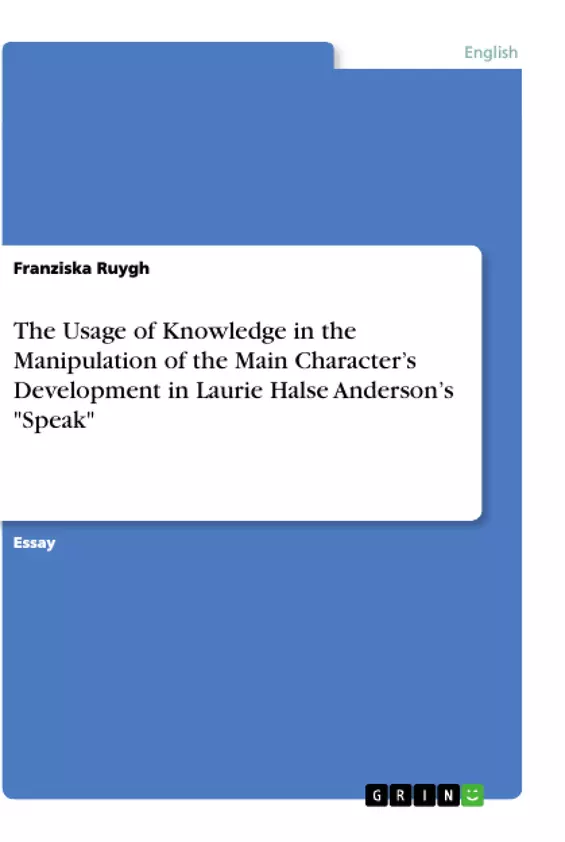This is an essay revolving around the thesis statement: "Anderson uses the concept of individual and mutual knowledge to manipulate Melinda’s ability and willingness to form and maintain relationships, which is evident in Melinda’s interactions with her parents, Ivy and Rachel."
"I did then what I knew how to do, now that I know better I do better." This powerful quote by Maya Angelou can be related to many different aspects of life. It represents sound advice for anyone and encourages each of us to do our best. Angelou reminds us that our knowledge is ever evolving and that, even though we might have done our best some time ago, learning enables us to do even better today and in the future. This makes knowledge important for all instances in life, but especially when interacting with people. Steven Pinker is a renowned experimental psychologist and a professor of psychology at Harvard University. He researches the importance of knowledge in social interactions. He relates the concept of individual and mutual knowledge to the way humans communicate with each other. While individual knowledge is defined as the knowledge that one person has, separate from other people, mutual knowledge is the knowledge that is shared between people. That means that person A knows something, person B knows the same thing and they are both aware that the other knows.
Inhaltsverzeichnis (Table of Contents)
- The Usage of Knowledge in the Manipulation of the Main Character's Development in Laurie Halse Anderson's Speak
- Acknowledgements
- Individual and Mutual Knowledge in Communication
- Melinda and her Parents
- Melinda and Ivy
- Melinda and Rachel
- Conclusion
Zielsetzung und Themenschwerpunkte (Objectives and Key Themes)
This essay aims to explore the role of individual and mutual knowledge in the development of the main character, Melinda Sordino, in Laurie Halse Anderson's novel, Speak. The essay analyzes how the manipulation of these concepts shapes Melinda's ability to communicate and form relationships, impacting her journey of healing and self-discovery.
- The impact of individual and mutual knowledge on communication and relationships
- The use of knowledge manipulation in shaping character development
- The exploration of trauma and its effects on social interaction
- The importance of communication and understanding in overcoming adversity
- The significance of the novel Speak in providing insights into the experiences of teenage girls
Zusammenfassung der Kapitel (Chapter Summaries)
The essay focuses on three key relationships in the novel: Melinda's relationship with her parents, her friendship with Ivy, and her encounters with Rachel. The essay examines how the lack of mutual knowledge and the manipulation of individual knowledge within these relationships influence Melinda's struggle with communication and her inability to seek help for her trauma.
The essay analyzes how Melinda's parents remain unaware of the traumatic event that has shaped her behavior. The lack of mutual knowledge creates a disconnect between them, hindering any possibility of emotional support or understanding. However, the essay also highlights a shift in the relationship as Melinda's parents begin to recognize that something is wrong, hinting at a potential breakthrough in their communication.
The essay further explores Melinda's relationship with Ivy, focusing on their limited interactions and the gradual development of a connection, primarily through shared interests and experiences in art class. The essay shows how a brief exchange of information about Melinda's abuser, Andy Evans, contributes to a shift in Melinda's awareness of her situation but does not necessarily translate into mutual knowledge.
Schlüsselwörter (Keywords)
The essay focuses on the key concepts of individual and mutual knowledge, as well as their role in shaping communication and relationships. The analysis explores the impact of trauma on social interactions, particularly in the context of teenage experiences. Key themes include communication, understanding, relationship dynamics, and the importance of self-expression and healing.
Frequently Asked Questions
What is the central thesis of the essay on Laurie Halse Anderson's "Speak"?
The essay argues that the manipulation of individual and mutual knowledge affects the main character Melinda's ability to form and maintain relationships.
What is the difference between individual and mutual knowledge in this context?
Individual knowledge is what one person knows separately; mutual knowledge exists when both parties know something and are aware that the other knows it too.
Which relationships are analyzed in the essay?
The analysis focuses on Melinda's interactions with her parents, her friend Ivy, and her former friend Rachel.
How does trauma impact Melinda's communication with her parents?
The lack of mutual knowledge regarding her trauma creates a disconnect, preventing emotional support and hindering her recovery.
What role does the art class play in Melinda's development?
The art class facilitates a gradual connection with Ivy through shared interests, illustrating a shift in Melinda's awareness and self-expression.
- Quote paper
- Franziska Ruygh (Author), 2020, The Usage of Knowledge in the Manipulation of the Main Character’s Development in Laurie Halse Anderson’s "Speak", Munich, GRIN Verlag, https://www.grin.com/document/1008683



